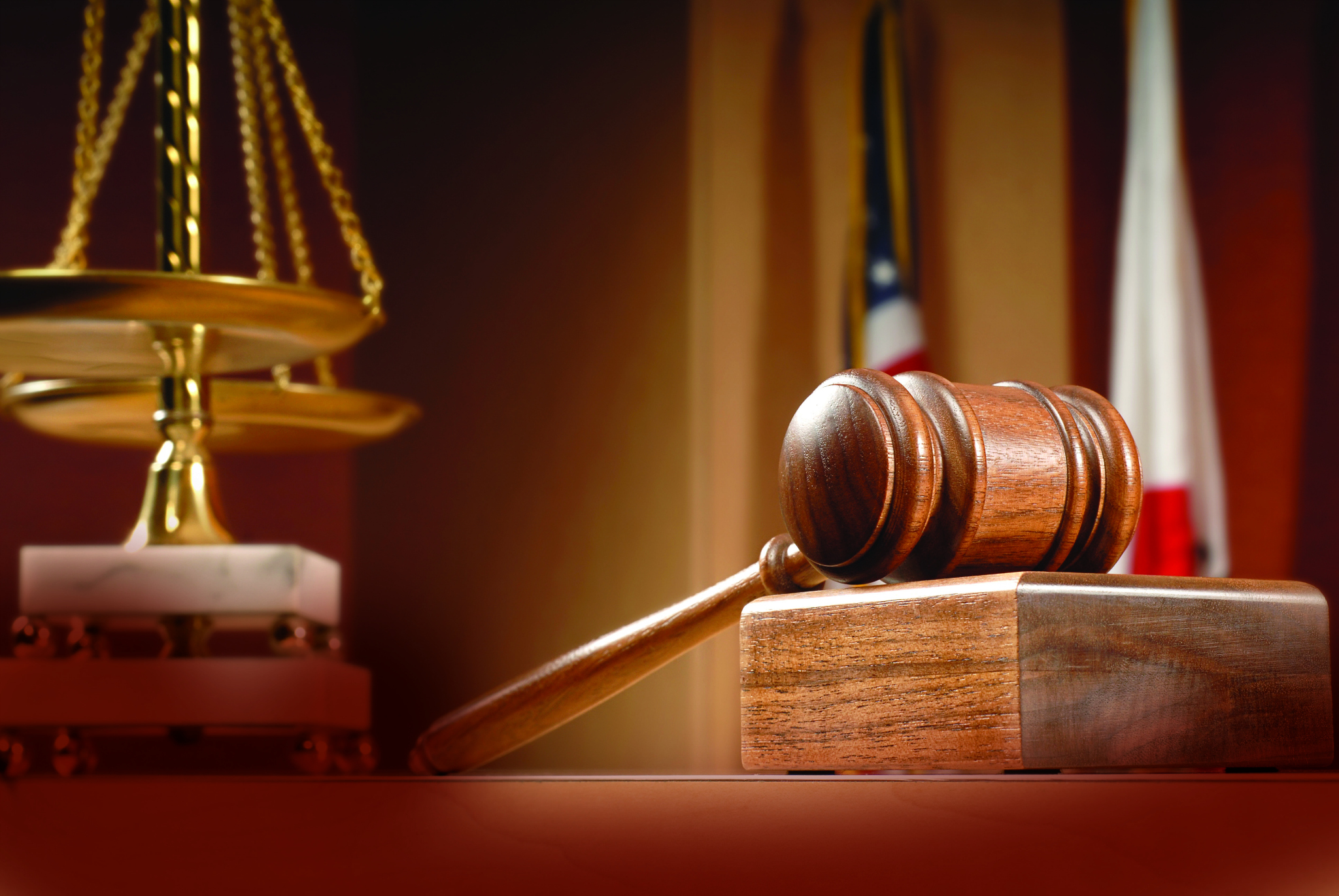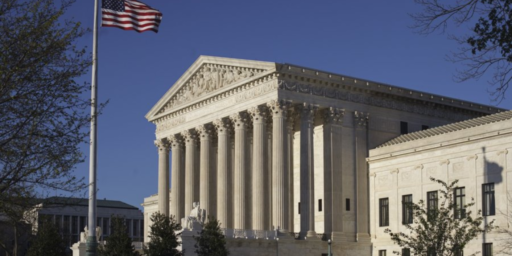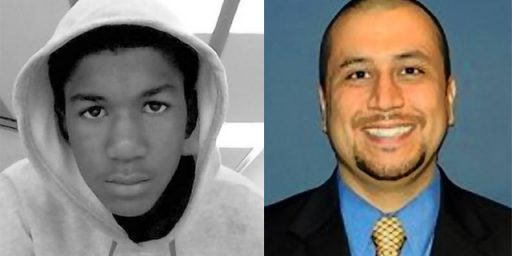Trump Judge Acquits January 6 Non-Rioter
Two hundred-odd people have pled or been found guilty. One has been acquitted.

POLITICO (“Judge issues first outright acquittal of Jan. 6 riot defendant“):
A judge has issued the first outright acquittal of a defendant charged in the Capitol riot.
Following a two-day bench trial in U.S. District Court in Washington, New Mexico engineer Matthew Martin was acquitted Wednesday on four misdemeanor charges by U.S. District Court Judge Trevor McFadden. Martin claimed that he thought the police had allowed him into an entrance near the Capitol Rotunda on Jan. 6, 2021.
McFadden said that, based on video of the scene, that assertion was at least “plausible” and that prosecutors failed to prove the case beyond a reasonable doubt. “People were streaming by and the officers made no attempt to stop the people,” said the judge, an appointee of President Donald Trump.
Prosecutors argued that broken windows and blaring alarms should have alerted Martin that he did not have permission to enter, but McFadden said the sheer size of the crowd coupled with the conduct of the police undermined that evidence.
The ruling is a blow to the Justice Department and seems likely to elevate similar defenses from hundreds of other members of the mob who have claimed that they didn’t know they weren’t permitted inside the Capitol and believed that police officers had approved their presence.
Martin, who became the first Jan. 6 defendant to testify in his own defense, said he believed that an officer waved him into the Rotunda lobby at about 3 p.m. that day. McFadden said that he did not believe that, but that the way the officer briefly interrupted the flow of people and then stepped back to allow it to resume could have given Martin that impression. “I do think the defendant reasonably believed the officers allowed him into the Capitol,” the judge said.
McFadden stressed that he wasn’t criticizing the officers, who he said “were grossly outnumbered at that point.” “I think they acted responsibly and reasonably throughout,” the judge said.
The prosecutors are almost certainly correct that a reasonable person, seeing broken windows and hearing blaring alarms, would sense that something was amiss and that entering the building was unwise. But I could see a judge thinking there was reasonable doubt as to whether a particular individual thought otherwise.
However, the verdict could be viewed as a message from McFaddento prosecutors that pursuing criminal charges against nearly every demonstrator who entered the Capitol on Jan. 6 was unwise and that resources should have been trained more intensely on those accused of violence or of conspiring to block the electoral vote count.
I’m sympathetic to that notion, actually. And the expenditure of taxpayer resources to punish Martin for “aggressive tourism” serves no obvious purpose.
McFadden called Martin’s conduct “about as minimal and not serious as I can imagine” among Jan. 6 defendants.
Martin faced charges of entering and remaining ina restricted area set up for a Secret Service protectee, disorderly conduct in such an area, disorderly conduct on the Capitol grounds and parading or demonstrating in the Capitol.
The judge said that after Martin went inside, he generally milled around and stayed away from areas in the Rotunda where some demonstrators were taunting and skirmishing with police.
“He seemed quite quiet and orderly,” McFadden said. “He did not shout. He did not raise his flag.”
McFadden also said that while Martin was in the Capitol, he spent much of the time making videos with his phone, which the judge said wasn’t much different than what members of the press were doing.
McFadden called the first charge against Martin, knowingly entering in and remaining in a restricted area, a “close call.” The judge added: “But under our system of justice close calls go to the defendant.”
I have argued, almost from the beginning, that what I have termed the “Capitol riot” of that day was more than one thing. There were organized right-wing thugs out to wreak havoc and/or intimidate Senators into throwing out electoral votes for Biden. There were Stop the Steal protestors whipped up into a frenzy by Trump. There were hangers on there to take selfies for their social media accounts. And there were people like Martin, who wandered into the Capitol well after the initial breach who were basically just soaking up the atmosphere.
Distinguishing between these groups at the individual level is challenging, indeed. As is determining the appropriate level of punishment for each individual, given that it’s essentially a one-off occurrence that has to be retrospectively shoehorned into existing criminal statutes. Prosecutors are, not surprisingly, trying to narrow the distinctions. Judges are charged with making them. It’s right there in the name.
Alas, while—judging only from the POLITICO account—McFadden strikes me as having gotten it right here, the fact that he was appointed by Trump naturally raises questions of bias. (Of course, the same is true of Democratic appointees, who would presumably be more inclined to see all of the Trumpers as insurrectionists.)
Prosecutors urged the judge to treat Martin’s testimony with extreme skepticism, contending that he was evasive on the stand and had carefully crafted his answers to downplay his culpability. They noted that Martin and his attorney had attended a recent Jan. 6 trial McFadden presided over and studied how to craft a defense that might play to his previous rulings.
McFadden’s verdict is the latest in a series of rulings from the Trump-appointed judge that have disappointed prosecutors and broken sharply from colleagues on the U.S. District Court in Washington.
McFadden has repeatedly given short probation sentences to Jan. 6 defendants who the Justice Department has said deserved jail time. And he has questioned the merit of some of the misdemeanor cases that the department has brought against some nonviolent defendants in the Jan. 6 mob.
There’s too little information to go on here. That prosecutors think someone they have charged with a crime deserves jail time is almost axiomatic. And, honestly, misdemeanor offenses by people with no priors likely should come with light punishment. But, again, that requires looking at individual conduct rather than the “Capitol riots” as an entity.
It’s noteworthy that Martin has already paid heavily for his actions that day, even though he was ultimately acquitted. In addition to whatever legal bills he has incurred over the past fifteen months, he’s lost his job.
Martin didn’t show visible emotion in the courtroom as he listened to the verdicts on Wednesday afternoon, but told reporters outside the courthouse that he hoped to get his job back as an engineer for a government contractor in Los Alamos, N.M. He was fired after his employer learned of his involvement in the Jan. 6 events. Martin also lost a “Q” Energy Department security clearance that he held.
My guess is that, even though he has been acquitted, he won’t get the clearance back. And that limits his employability.
An interesting coda to the story that speaks to the “trial tax” Matt Bernius has written about.
About 200 of roughly 800 people charged in connection with the Jan. 6 riot have pleaded guilty. Sentences have ranged from probation to more than five years in prison.
However, before Wednesday’s not-guilty verdicts for Martin, trials had been completed in only two other Jan. 6 cases. The first Jan. 6 defendant to go to trial, Texas militia member Guy Reffitt, was convicted by a Washington jury last month on all five felony counts he faced.
The second case, that of Couy Griffin, a New Mexico county commissioner and Cowboys for Trump founder, was also a bench trial before McFadden. Griffin faced two misdemeanor counts: entering a restricted area and disorderly conduct. McFadden found Griffin guilty of the trespassing charge but acquitted him of disorderly conduct.
While the 6th Amendment guarantees the right to a speedy trial, inadequate infrastructure means that they seldom occur. We’re fifteen months out from the riot and only three of 800 people have seen their cases go to trial—plus another 200 or so who pled guilty in exchange for getting the damn thing over with. That’s roughly 600 people who have had their lives on hold, lost jobs, and face untold legal bills over what, in almost all cases, are misdemeanor offenses. That’s a hell of a “tax.”
I get that most OTB readers will have little sympathy that this is happening to relatively affluent white people who support Donald Trump. But few of them are actually criminals in any meaningful sense.
We should absolutely be allocating as many resources as necessary to get to the bottom of the conspiracy to steal the election. We should absolutely go after the Proud Boys and others who plotted the assault on the Capitol and those who committed acts of violence and mayhem that day. But I’m not sure what purpose is served by going after sad sacks like Martin.






This really says it all, doesn’t it?
Despite the broken windows and blearing alarms, he was invited in. By a police officer, no less.
I’m 100% that Martin believes he is a “real American,” part of the “silent majority,” with all the “good cops” on his side. (“Martin said he had an idyllic experience on Jan. 6 […] ‘It was a magical day in many ways.'”)
And because of that, he believes his behavior should be excused. The Trump-appointed judge believes his behavior should be excused.
And even James Joyner thinks his behavior should be excused because it wasn’t a big deal somehow.
@James: You may not realize it, but this man was trying to negate and nullify your political rights. In particular the right to democratically elect your government.
He was trying to steal from you out of a monstrous sense of entitlement.
But for some reason (His beliefs? His tribe?) it’s no biggie?
Don’t you want to defend what’s rightfully yours?
Dr. Joyner…. your blind spot is amazing.
Seriously.
Just no. Broken windows. Alarms blaring. Injuried police officers. A gunshot!
Tourism?
You’re completely minimizing the ENTIRE REASON THEY WERE THERE IN THE FIRST PLACE.
Dammit man.
So frustrating.
It’s not a tax, James. It’s the “find out” phase of “Fuck around and find out.”
@EddieInCA:
They were only trying to nullify the votes of 81 million Americans.
Let’s not make too big a deal out of it.
@drj:
@EddieInCA:
I’ve written dozens of posts on the Capitol riots. I’m fully aware of what they were. But, as noted here and in many other posts, there’s a difference between what the larger event was and whether any particular individual who participated in it is guilty of a crime and what crime they’re guilty of.
@Cheryl Rofer: The fact that we don’t like these particular individuals and think that justifies whatever they get doesn’t negate a larger systemic problem. Americans are severely punished for exercising their Constitutional right to a trial. We shouldn’t be happy about that.
@Cheryl Rofer:
Cheryl, it’s very much a tax when you look at our system of coercive plea dealing in its entirety. So much so that soon to be Supreme Court Justice Jackson wrote her undergraduate senior thesis on it (before it was a fashionable topic).
And while I have no sympathy for 1/6ers (as previous comments will demonstrate), looking at individual cases makes bad policy when it comes to law (and most other aspects of government).
Also:
The issue of speedy trial is an aspect of the”trial tax” that I have not addressed in my post on the topic here. It’s something I’ll get to this weekend, because this is something that needs to be called out as well (especially as the only time requirement in terms of “speed” is the 48 hours the Supreme Court established for arraignment). The lack of speed with which our system operates is another key factor in coercive plea deals and the rise in convictions which continues to ruin lives. Or, if they maintain their innocence can turn into horror stories like https://en.wikipedia.org/wiki/Kalief_Browder
@James Joyner: I will believe your concern when you voice it for all the poor folk in, say, New York City.
As to “Fuck around and find out,” it’s a law of nature. Some of us learned it when we were kids, but it’s always a salutary lesson.
@mattbernius: We wrote our replies simultaneously. If only the rich people finding out would lead to a better outcome for everyone. But it won’t. Too many people will take James’s easy position that these maligned people who look like me shouldn’t be treated this way.
So the whole exterior assault on the Capitol building and its police officers somehow escaped the notice of the Mr. Martin, during the insurrection, as well as the judge’s cognitive ability to sensibly discount any reasonable doubt on the defendant’s part in such an event. Only Mr. Magoo would be entitled to a reasonable doubt consideration in such a case. Unfortunately, the judge seems to share Mr. Magoo’s lack of situational awareness in justifying the ruling in this case. Sadly, others have and will do mental backflips to find a way to rationalize this outcome and, in doing so, diminish the ability to keep and maintain a government of the people.
@Cheryl Rofer:
I don’t write about criminal justice issues that often, given that it’s not my wheelhouse, but I’ve been pretty consistently civil libertarian on these issues going back decades. I’ve written a number of times about the appalling nature of our system of incarceration, the fact that long-term solo confinement amounts to torture, the prison rape trope, and all manner of related issues. I’m writing about the 6 January people not because they look like me but because the event itself is at the core of what I write about here and the individual cases spotlights these issues.
@James Joyner:
1. Martin did commit a crime (unless you want to believe that it’s reasonable for the police to invite you into the Capitol when a riot is going on).
2. It’s a well established principle in criminal law that intent matters – not just regarding the act itself, but also regarding the ultimate purpose of the act. (E.g., we consider stealing $1000 less bad than stealing $1000 to fund a terrorist group.) So it obviously does matter what the larger event was about. The perp wasn’t just a random drunk who was being obnoxious.
Why should someone who committed crimes wth the intent of depriving millions of his fellow citizens of their political rights not be punished?
Was Martin insane or mentally ill? If not, his ass should be thrown in jail.
FTFY James.
Just want to say that the Prison Industrial Complex ™ exists for the sole purpose of incarcerating sad sacks.
eta: read your above replies and also want to say that you and I largely agree on these issues.
“It’s noteworthy that Martin has already paid heavily for his actions that day, even though he was ultimately acquitted. In addition to whatever legal bills he has incurred over the past fifteen months, he’s lost his job.”
This is also true of, for instance, every young black man arrested for marijuana possession or daring to look a police officer in the eye or being black when a white cop didn’t want him around. And somehow this is never considered a factor for that guy. But a middle class white guy? Oh, the humanity!
@OzarkHillbilly: Oh, for sure. I do, however, tend to hold the DOJ and the federal courts to a higher standard, simply because they’re the A team.
@wr: That there are severe flaws elsewhere in the criminal justice system doesn’t really have much to do with whether this particular individual is guilty of a crime. Rather than treating everyone the same way as the worse case, we should be striving to get poor defendants the same access to due process as the more affluent.
If this guy believed he was being waved in then he is stupid, and no amount of jail time will fix stupid.
All these low level cases are meaningless.
Unless and until the organizers and instigators are held accountable our Democracy is at extreme risk.
Judge Carter in the Eastman documents case:
Emphasis, mine.
Absolutely. It’s like how in the midst of a riot in a city’s commercial district, when the police line has been pushed back and the massively outnumbered security guard at a store just stands there watching people stream in and out of the smashed up storefront looting things, it’s plausible that someone might mistakenly believe that passivity means they have permission to go in and check it out for themselves too.
@mattbernius:
The TL/DR for that is “Justice delayed is Justice denied.”
Judge provides defendant with a technicality to get off on.
Granted that’s rather verbose, but it’s a more catchy headline.
Político is just messing with us at this point, right?
@Gustopher: No, that’s a real thing.
@Cheryl Rofer:
I understand and empathize with that point of view. And from a system reform perspective its not very helpful (speaking from personal experience). And a lot of advocates who don’t look like me have spent a lot of time explaining why (including to me), even though it’s frustrating, hoping that well-to-do people get worse sentences only ends up harming people who look like them.
In no particular order:
– Yes, we shouldn’t be wasting resources on these low level offenses. I fear Garland is hoping if he fearlessly prosecutes nobodies we won’t notice who he isn’t prosecuting.
– The FBI, and to a lesser extent DoJ, used to have a very political reputation, eager to bash hippies and commies and Blacks. Less eager to take on organized crime or establishment figures. That all supposedly got reformed after Watergate. Did it?
– My standard complaint that “intent” is a black hole in our legal system leading to all sorts of silliness.
-Perhaps an early warning of where all these Republican judges are going. It’s been possible for decades to believe the Courts provided a backstop of reason, evidence, and Rule of Law. Perhaps less so going forward.
– @James Joyner:
Nirvana Fallacy. Yes we should. But we’re not going to. So where does that leave us?
– While this Republican judge could claim he’s upholding a right of peaceful protest, Republican states are imposing severe limits on protests.
– Skimming headlines this morning I saw resolution of cases going back to 2014 and 2017. These were likely cases where the defendant had money and lawyers and was largely responsible for much of the delay. But hardly speedy trials.
Stolen from elsewhere…
@James Joyner: ” Rather than treating everyone the same way as the worse case, we should be striving to get poor defendants the same access to due process as the more affluent.”
Yes, we should. Somehow that never happens. But there is always an endless well of sympathy for the well-off white Republican guy who might have to face consequences for his crimes coming from people — not pointing a finger at you, sir, as I know you have written on the subject — who absolutely see this as a major problem with the system of justice in our great nation, and yet who somehow manage to forget they mean to correct the flaws in the justice system immediately after the white guy gets a pass.
Every person in that mob was aiding in the commission of a felony. Did this guy intend to aid in the commission of a felony? There was no evidence he was intellectually impaired so of course he knew it was a riot, of course he knew it was illegal, and of course he knew he was committing a crime.
This is a MAGA judge ignoring the law to rescue a fellow MAGAt which is itself a violation of the law – judicial corruption, political favoritism in sentencing.
So not only is @James hand-waving away the original crime, he’s hand-waving away the corruption of our courts. A very disappointing bad take. James needs to understand that there are no innocent decisions by MAGA judges, they have to be assumed to be corrupt members of a fanatical cult. A Trump judge has all the credibility of an ISIS tribunal deciding who to behead.
Dr. J.
I understand your reasoning. I don’t agree with it, nor am I surprised, but I do understand it.
I just wish the high-minded principles didn’t equate to separate and unequal justice for all, with the burden being unequal, and those in the upper reaches blind to the ultimate costs to society.
And unlike some here, I’m not surprised by the DOJ going after the low-hanging fruit. After all, that’s the stuff you don’t have to work to pick, and the conviction rate is what’s important to most prosecutors, not the justice achieved.
@Cheryl Rofer: Indeed. And it’s somewhat comforting to see that FAFO works at least.
@Flat Earth Luddite: Indeed!
In order to do that we would have to supply them with unlimited amounts of cash for high dollar lawyers.
Yeah, dreams I’ll never see.
@James Joyner:
“there’s a difference between what the larger event was and whether any particular individual who participated in it is guilty of a crime and what crime they’re guilty of.”
No. That’s complete bullshit. Every one of those assholes that marched on the capitol and stormed it to “stop the steal” was an insurrectionist. It does not matter if they were polite about it. They are polite fascists seeking to destroy America and fuck every last one of them.
This guy enabled the worst actors of the insurrection. They provided moral support and numbers. At best they were idiots acting as cannon fodder for the people trying to hang Mike pence and install Trump as dictator for life.
At best.
And that still absolutely deserves prison.
@James Joyner:
It is difficult for me to imagine a better way to accomplish true justice than to treat privileged criminals the way non-privileged are treated.
Once the people with power learn how the system works, change is inevitable.
@Tlaloc:
I understand that’s how you feel. Regardless, prosecutors have the burden of proving that, one by one, beyond a reasonable doubt.
“Your Honor, I just assumed since there was no cashiers and the store had been evacuated, that the stuff there was free as the security guards stood by silently as I acquired some items. My intent was not to steal but to clean up the debris. When I realized the store had no trash bins, I took this debris home with me awaiting disposal on garbage day when the police took away the TVs meant for the trash.”
Judge Joyner: “well seeing as you weren’t there for the initial looting and was just there to witness the damage and were trying to clean it up and didn’t want to litter, case dismissed.”
@The Q: The analogy is just silly. Being inside the Capitol isn’t a crime. Walking around the Capitol taking pictures isn’t a crime. Indeed, as the judge noted, there were members of the press doing the exact same thing.
So they were just “tourists”? And Jan 6 was like any other day to “wander around the Capitol buildings?
I think you are completely overlooking the context of why “the press was walking around taking pictures that day”.